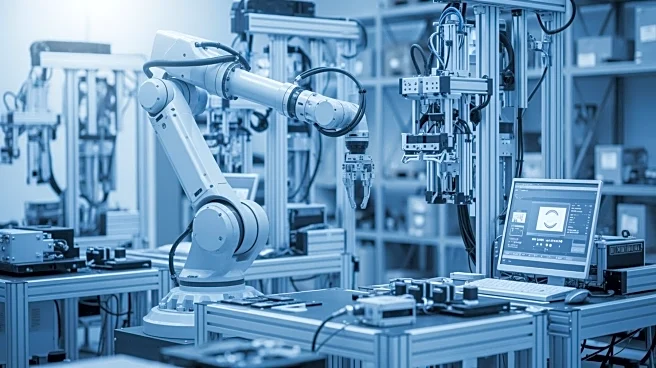What's Happening?
Amazon is reportedly planning to automate a significant portion of its operations, potentially replacing over half a million jobs in the United States with robots. According to a report, the e-commerce
giant aims to automate 75% of its operations, which could lead to a reduction in the need for human labor in its warehouses. This move is part of Amazon's strategy to increase efficiency and reduce costs, as the company expects to double its product sales by 2033. Despite these plans, Amazon has stated that the leaked documents do not accurately reflect its overall hiring strategy. The company has also announced plans to hire 250,000 people for the upcoming holiday season, although it is unclear how many of these positions will be permanent.
Why It's Important?
The potential automation of Amazon's operations could have significant implications for the U.S. labor market, particularly in the warehousing sector. As one of the largest employers in the country, Amazon's shift towards automation could set a precedent for other major companies, potentially leading to widespread job displacement. This move could disproportionately affect communities of color, as Amazon's warehouse workforce is significantly more diverse than the average U.S. workforce. However, the company argues that automation could lead to the creation of new roles in technology and innovation, potentially offsetting some job losses. The broader impact on the economy and society will depend on how these changes are managed and communicated.
What's Next?
Amazon is expected to continue its automation efforts, with plans to retrofit existing warehouses and implement robotic systems in new facilities. The company is also strategizing on how to manage public perception and community impact, potentially through increased participation in local events and initiatives. As Amazon progresses with its automation plans, other major employers may follow suit, leading to further discussions on the future of work and the role of automation in the economy. Stakeholders, including policymakers and labor organizations, will likely engage in debates on how to balance technological advancement with job preservation.
Beyond the Headlines
The ethical and social implications of Amazon's automation strategy are significant. The potential job losses raise questions about corporate responsibility and the need for companies to support affected workers through retraining and reskilling programs. Additionally, the shift towards automation highlights the growing importance of technological literacy and the need for education systems to adapt to prepare future workers for a changing job market. The long-term cultural impact of such a transformation could redefine the nature of work and employment in the U.S.










